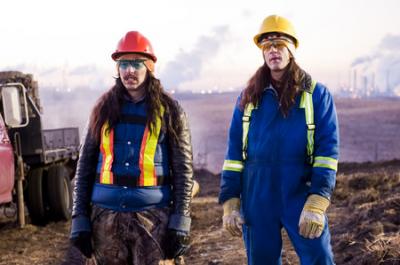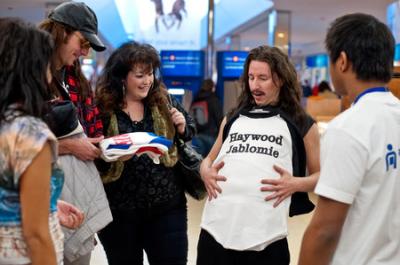By: debbie lynn elias
We first met Terry and Deaner back in 2002. Deadbeat, party-hearty stoner dudes, they were the life of the party, stuck in an 80’s time warp of mullets and metal. Now fast forward to 2011. Life hasn’t been easy for either of time. Cancer, marriage, children, divorce have plagued Deaner. But no matter what, Deaner, and Terry, have faced it all the same way they have always faced life – with laughter, parties and unending friendship. But now the maturity clock is ticking and the boys need to “grow up” and grow a set [and for Deaner that may prove medically difficult]. Convincing their friend Tron to get them a high paying job working the oil pipeline in Fort McMurray, Canada, we come along for this new chapter in the boys’ lives, a chapter that includes a woman for Terry who may break up the greatest duo since peanut butter and jelly.
Directed and written by Michael Dowse together with David Lawrence and Paul Spence (who play Terry and Deaner, respectively), under cover of comedy hilarity, beer and bad language, FUBAR: BALLS TO THE WALL is actually a very sweet film. There is a simplicity as to how Terry and Deaner view the world that is refreshing, but is their friendship and the support system of family and friends that catapults this film into what I call, family fare (but for the language). Great family concepts, a supportive mother, supportive wife, supportive girlfriend who tries to keep friends together – very wholesome elements – and all set against a backdrop Christmas. The improvisational skills of Lawrence and Spence are off the charts, while well known Canadian jazz singer, Terra Hazelton, making her film debut as Terry’s girlfriend Trish, steals every scene when going toe-to-toe with the boys.
With FUBAR:BALLS TO THE WALL hitting stores shelves on April 19th, I had a chance to talk with writer/director Michael Dowse about this strangely entertaining and sweet comedic gem.
This really is a charming sweet film this really is. You’ve got these great family concepts, supportive mother, supportive ex-wife, supportive girlfriend who tries to keep friends together, really great elements.
MD: [chuckling] There you go. It is, isn’t it? Thank you. It’s a modern family.
I saw the same type of thing occurring in TAKE ME HOME TONIGHT. What is that lends itself and makes you gravitate toward these kind of stories and films?
MD: I don’t know if I gravitate to it or if I just sort of turn everything into giving it a heart. Every time I make a film I just try and get as much comedy out of it and hand in hand with that you also get a lot of emotional honesty. It’s something I try to do with every film I make. I think that’s more the by product rather than me being attracted to these stories. It’s something I just try and unearth from everything I do.
You do an excellent job of it. With these particular characters, Dean and Terry, what is it that you love about them that made you want to go back and revisit them?
MD: For me anyway, FUBAR: BALLS TO THE WALL, is almost like a reaction to TAKE ME HOME TONITE where after working on that film and having the release delayed for four years, and not really being a part of the final edit of that film, I wanted to get back to something which was improv; back to my roots essentially. FUBAR, the original, was my first film. So, I love working with those guys and I love working with a purely improv dialogue. Those guys [David Lawrence and Paul Spence] are great because they are so quick on their feet. As a director it’s a pleasure to direct them because you’re just sort of pushing them with ideas and tangents to take with dialogue. They’re such good friends, it’s great to work guys that are that close, that can certainly finish each other’s sentences.
You really capture that on screen. It comes through. You can’t develop that kind of camaraderie just in brief rehearsals.

MD: They are essentially brothers. They grew up as neighbors and have been friends since they were babies, so you’re right, exactly. And to put Terra [Hazelton] in between that was a big challenge for everyone but I think she excelled.
I think she did a beautiful job in the film. With the free-flowing dialogue that you allow the actors, you obviously have great structural constraints for the film in terms of shooting.
MD: The way we approach it is, we write a treatment which essentially looks like a script without its dialogue. That’s sort of the first rule of improv. You kinda gotta know where the scene is going a little bit in front of the camera or else you’re just spotting into the wind. We really spent a lot of time figuring out the story and then the icing was just the dialogue. That’s the fun part. That can be made up. But as long as each actor knows where they need to go in each scene, it’s a great way to work. And as long as the actors are comfortable.
Does this present any kind of problem for you in maintaining that even flow that you have within the story and the dialogue?
MD: As long as they actors aren’t trying to sabotage the narrative, changing it, you’re fine.
Have you encountered that situation where they have inadvertently tried to sabotage?
MD: As that came out of my mouth, I thought about that. No. I’ve never had that experience actually. But the free flowing, I think it comes from giving a lot of attention to the story right away and then in the writing phase. The double-edged sword of that is that when you don’t have any written dialogue you spend twice the amount of time editing because you have such a huge amount of footage to go through.
How long did it take to get your final edit on FUBAR: BALLS TO THE WALL?
MD: It took six months. Just to give you an idea. Our first assembly of the film is six hours long. [Laughing] Yeah, yeah. It’s like a playoff system. Anything that you think is remotely funny you put into the first cut of it. Then you can compare and contrast. It goes from six hours to 2 1/2 hours very quickly after that first screening, but that first one’s a doozy.
You’ve got it down to 85 -90 minutes now.
MD: Exactly.
It’s very compact, very concise and you never lose the rhythm or momentum with the cut that you have.
MD: I come from an editing background and my editor that I work with, Reg, is also a very good director himself so we have a great relationship in the edit suite. He makes sure we never stall for too long.
You also faces challenges from Mother Nature with this project, didn’t you?
MD: [laughing hysterically] It was freezing. My last two films I’ve shot in winter and I definitely don’t want to do another winter movie.

What would possess you to want to go shoot something knowing the temperature is expected to go to minus 22?
MD: I was excited to make a Christmas movie. That’s kind of what this thing turns into by the third act. So, that was part of it, is that I was needing it to be snowing. But I love Christmas movies. One of my favorite movies is “Christmas Vacation”, so that’s what compelled us. But it is no fun to shoot in those conditions. The nice thing is that if you are shooting outside and it’s freezing and it’s minus 40, your coverage is a lot less. You’re definitely a lot let precious about stuff.
Shooting in those harsh conditions, does it present any kind of technical challenges in terms of the equipment?
MD: A little bit but nothing crazy. The cameras we shot on were workhorses so we didn’t ever actually have a camera issue.
What format were you shooting?
MD: We shot on HD, the higher end Prosumer cam with a bunch of doodads stuck to it to make it even fancier.
 What is it that you personally took away from this particular film?
What is it that you personally took away from this particular film?
MD: Just how much fun it is to improvise. It’s something that I try to put into all my work. For me it was great just to get back to making a fun movie and to have complete creative control and not to have to deal with too many cooks in the kitchen. Just get back to working with some close friends and making something that was smaller in scale but making it as funny if not funnier. The film before that was a studio film and it had its troubles so it was great to get back to basics.
Do you think you would like to keep doing the more independent films so you do retain creative control?
MD: It’s a balance. I think I’m blessed that we have basically an independent studio system up here in Canada where I can keep making films that are under $10 million and have pretty much creative control over them. But that said, I’m also a director. I like working on bigger stuff. I’d like to keep an iron in the fire in each country.
What are the benefits of the Canadian film system? Britain just lost the UK Film Council.
MD: We’re in the middle of an election so we’ll see. If our conservative government gets a majority, I pray for the future of our Canadian film industry. The writing’s on the wall, I think, with the UK Film Council being cancelled. The benefits for us is that we are essentially one of the last independent film studios and we can essentially within the country, finance smaller films, which is a great gift. A lot of other places don’t have that or if you do raise the money, there’s much more financial pressure on you to succeed. Here, it’s a great great system. Unfortunately, it’s been abused by a lot of people who haven’t been making good films with it.
And unfortunately when that happens, if the tides turn with the government, then filmmakers such as yourself who are making good films will suffer the brunt.
MD: I will happily be doing dog movies in Los Angeles if that happens. I really like working in the studio system. It was great and I would hope to do it in the future, too.
Do you have anything lined up now?
MD: Nothing lined up right now. I’m just finishing a film called GOON that stars Sean William Scott, Jay Baruchel, Liev Schrieber, Alison Pill, Eugene Levy. It’s my “Raging Bull on Ice.” A comedy about a hockey pugilist. I think we’ll premiere it at Toronto this year but I’m literally just finishing the cut right now. That’s coming out. And as soon as I finish the cut I’m gonna take a couple months off and then get the next thing going.
Well, I can’t wait to see the hockey movie. Canada, hockey. I’m from Philadelphia and the days where almost everyone on the Flyers hockey team was from Flin Flon, Manitoba.
MD: Oh yea! Then you’ll get it! [laughing] Actually, I think it transcends a Canadian hockey movie. It’s a great sports movie. It’s inspirational and it’s violent and it definitely is a pretty amazing film.
Did you write that one also?
MD: No. Jay [Baruchel] wrote it with Evan Goldberg who wrote “Pineapple Express” and “Superbad.”
I look forward to that one next year. Thank you so much. And congratulations on FUBAR: BALLS TO THE WALL.
MD: Thank you. It was a blast to make, for sure.
#












